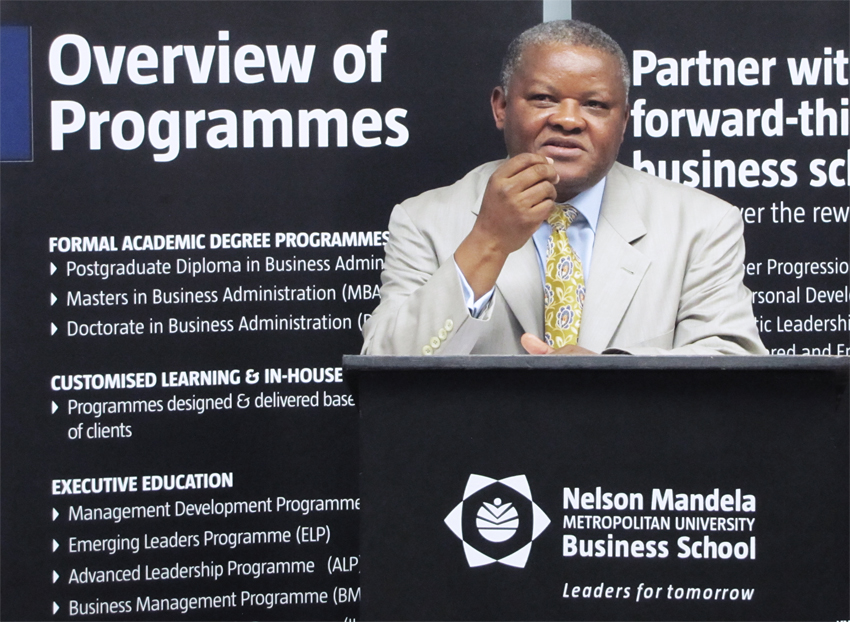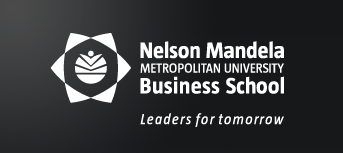Macozoma to NMMU: Nine Challenges for Leaders Today

Port Elizabeth, 22 November 2013 – NMMU Business School hosted renowned and iconic South African business leader Saki Macozoma for a guest lecture last week and concluded the 2014 season of its flagship public lecture anthology Strategic Conversations on a highly topical note, delving into Leadership Challenges of the 21st Century.
Attendees of the lecture included senior leaders of private and public sector firms, the Nelson Mandela Bay Business Chamber, students and alumni who visited the school for Macozoma’s public lecture. Welcoming the guest speaker back to his home province, NMMU Business School Director Prof Steve Burgess observed that Macozoma’s distinguished career and many accomplishments serve as an inspiration to anyone who aspires to leadership.
Macozoma began his address by explaining that leadership has always been a deeply enchanting concept for society, business and literature because those with leadership skills and attributes have the power change the course of history. However, he noted that leadership must be approached today with a more holistic understanding, grounded in twenty-first century realities that shape the very nature and fabric of human interactions.
The Nine Leadership Challenges of the 21st Century Leader
Macozoma identified nine leadership challenges for today. He began his list with speaking of how, firstly, leaders of the twenty-first century need to embrace the unknown more readily. Macozoma commented that “leaders are not like futurists” who can risk predicting an unknown future. However, the unknown is not the enemy of good leadership, but instead something that a leader needs to accept and embrace.
His second point was that the problems of the twenty-first century are multi-dimensional and more complicated than the challenges of the past. A more globalised world has resulted in challenges for leaders that are no longer straight-forward. Instead, they are intricate and sophisticated and a leader needs to understand them as such.
Thirdly, Macozoma spoke about leaders and the struggle against populism. It is not the role of the leader to be popular, he stated, but rather to do what is necessary. A leader needs to make difficult decisions, and not simple do what will make his followers happy.
These challenges are all predicated on an uncertain economic future. During this segment of his talk, Macozoma gave mention to Elon Musk and the futures new possible forms of energy.
These uncertain economic futures and willingness to embrace the unknown gave way to Macozoma’s fifth point: the “twentieth century gives us little time to develop long term strategies.” The world is changing at such a rapid pace that long term strategies are no longer a viable option for the leader, rather a good leader needs to be able to adapt and change in shifting economic, political and social landscapes.
“Leaders have more connectors in a complex ecosystem,” Macozoma went on to say, his sixth point. Communications have changed within business and the move away from a system of hierarchy to a more open ended system has resulted in leadership roles emerging in a dynamic and complex ecosystem.
Macozoma continued by speaking of the ostensible talent crisis a leader of today faces. The population of the planet is growing, however the amount of available talent is not. This challenge is unique to the leader of the twenty-first century and one that is difficult to approach without a noticeable risk.
The growing inequality was Macozoma’s penultimate point and something that a leader needs to be ready for. The inequalities faced are wide and varied: whether they be political, social or economic.
His concluding point is the generational shifts of today. As the generational gaps get smaller and smaller, the challenges a leader faces become more involved and sophisticated.
What is required of leaders,” concluded Macozoma, “is to do more with less.”
Graduate School Director Professor Kobus Jonker said: “Macozoma, chairman of Liberty Holdings and Stanlib and the former president of Business Leadership South Africa was the ideal choice to conclude our series given his expertise on the subject of leadership as evinced by the important issues that he raised and discussed.”
About Macozoma
Born in Port Elizabeth, Macozoma was educated at All Saints Mission School in Transkei, Loyiso Secondary School in Port Elizabeth and Kwazakele High School, Port Elizabeth. He studied political science, economics and journalism at the University of South Africa and Boston University in the USA.
In addition to Stanlib and Liberty Holdings, Macozoma is also the chairman of Mandela Bay Development Agency, Tshipi é Ntle Manganese Mining, Ntsimbintle Mining and Safika Holdings and he also holds the position of deputy chairman for Standard Bank. He was the former chairman of Council on Higher Education, the President’s Big Business Working Group and co-chairman of the Business Trust.
In 2012 Macozoma and former president Nelson Mandela were together awarded the University of South Africa's (UNISA) highest honour a Calabash award and received the university’s first Robben Island alumnus award. The award is to honour those who were imprisoned by the apartheid regime because they fought against the system of State oppression.
Last month, The Anglican Church of Southern Africa honoured Macozoma when the Most Rev'd Thabo Makgoba, Archbishop of Cape Town admitted him to the Order of Simon of Cyrene at a meeting of the church’s Provincial Synod in Benoni, Gauteng.





